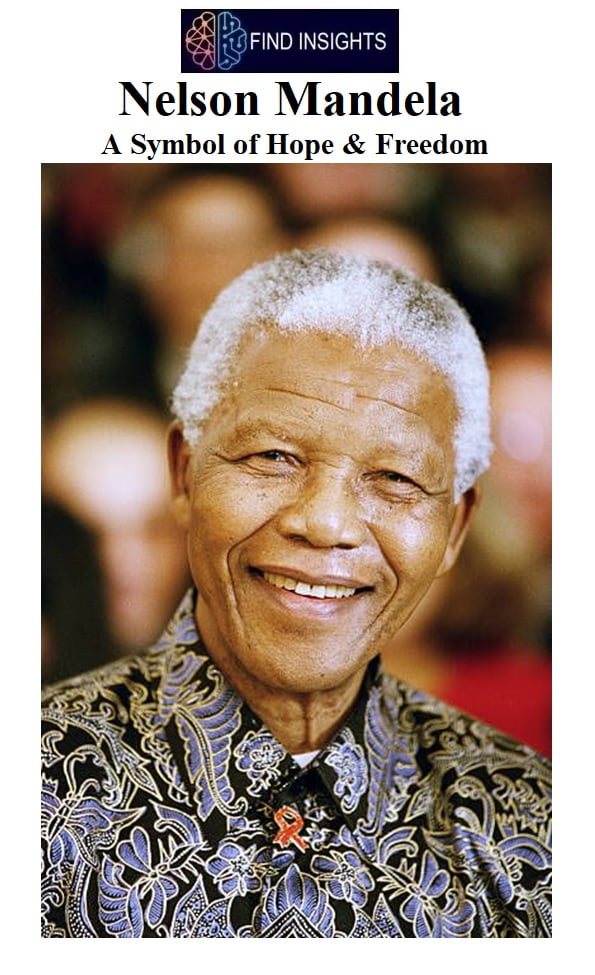
Introduction
Nelson Mandela, one of the most prominent figures in modern history, is renowned for his relentless struggle against apartheid in South Africa. His unwavering commitment to justice, equality, and freedom made him an international icon. This article delves into the life, accomplishments, and lasting legacy of Nelson Mandela, celebrating his immense contributions to the world.
“Nelson Mandela: A Visionary Leader and Icon of Freedom”
Early Life and Education of Nelson Mandela
Born on July 18, 1918, in Mvezo, a small village in South Africa, Nelson Mandela hailed from the Madiba clan. Despite growing up in a society plagued by racial discrimination, Mandela’s father, a counselor to the royal family, instilled in him the values of fairness and equality. Education played a vital role in shaping Mandela’s worldview. He attended Fort Hare University, where he became exposed to radical ideas and political activism.
Activism and Anti-Apartheid Movement
Mandela’s entry into politics began in the early 1940s when he joined the African National Congress (ANC). The ANC, founded in 1912, aimed to fight against racial segregation and discrimination. Mandela’s passion for justice and equality propelled him to the forefront of the anti-apartheid movement. He played a pivotal role in organizing protests, strikes, and acts of civil disobedience to challenge the oppressive apartheid regime.
Imprisonment and Robben Island
In 1962, Mandela’s activism and leadership led to his arrest and subsequent trial. He was sentenced to life imprisonment, spending 27 grueling years behind bars, primarily on Robben Island. Despite the hardships and isolation, Mandela’s spirit remained unbroken. He became a symbol of resistance and defiance, rallying his fellow prisoners to fight for their rights and dignity.
Release and Negotiations
Mandela’s release from prison on February 11, 1990, marked a turning point in South African history. His freedom signaled a new era of hope and possibility. Mandela engaged in negotiations with the apartheid government, aiming to dismantle the oppressive system peacefully. His charisma, wisdom, and unwavering commitment to non-violence helped steer the country toward reconciliation and democratic reforms.
Presidency and Reconciliation
In 1994, South Africa held its first democratic elections, and Nelson Mandela emerged as the country’s first black president. During his presidency, Mandela focused on healing the wounds of apartheid and fostering unity among the diverse population. He initiated the Truth and Reconciliation Commission, allowing victims and perpetrators of apartheid-era crimes to tell their stories and seek forgiveness. Mandela’s leadership and determination laid the foundation for a democratic and inclusive South Africa.
Legacy and Impact of Nelson Mandela

Nelson Mandela’s impact transcended borders and inspired people around the globe. His tireless efforts for equality, justice, and reconciliation earned him numerous accolades, including the Nobel Peace Prize in 1993. After retiring from politics, Mandela dedicated himself to charitable work through the Nelson Mandela Foundation, promoting education, health, and human rights. His legacy continues to guide and inspire future generations to fight against injustice and build a more equitable world.
Conclusion
Nelson Mandela’s life story embodies the triumph of hope over adversity, of resilience in the face of injustice. He remains a shining beacon of courage and compassion, reminding us of the power of forgiveness and reconciliation. Mandela’s journey from prisoner to president leaves an indelible mark on history, reminding us of our collective responsibility to fight for a more just and inclusive world.
FAQs
What was Nelson Mandela’s most significant accomplishment?
Nelson Mandela’s most significant accomplishment was his instrumental role in ending apartheid in South Africa and fostering a peaceful transition to democracy.
How did Nelson Mandela contribute to reconciliation in South Africa?
Mandela initiated the Truth and Reconciliation Commission, which allowed victims and perpetrators of apartheid-era crimes to come forward, share their stories, and seek forgiveness, fostering a process of healing and reconciliation.
What is the Nelson Mandela Foundation?
The Nelson Mandela Foundation is a charitable organization established by Mandela after his presidency. It works to promote education, health, and human rights in South Africa and beyond.
How did Nelson Mandela inspire the world?
Mandela’s unwavering commitment to justice and equality, his ability to forgive and reconcile, and his leadership in the fight against apartheid inspired people worldwide and continues to serve as a beacon of hope.
What is the significance of Nelson Mandela’s birthdate, July 18?
Mandela’s birthdate, July 18, is celebrated as Mandela Day globally. It serves as a day of remembrance, promoting community service and the idea that each individual has the power to make a positive change in the world.
LIKE WHAT YOU’RE READING?
CHECK OUT SOME OF OUR OTHER GREAT CONTENT HERE
- TOP SKILLS EVERY ENTREPRENEUR SHOULD HAVE
- ARTIFICIAL INTELLIGENCE (AI) – A BEGINNER’S GUIDE
- HOW TO START A CAREER IN ARTIFICIAL INTELLIGENCE?
- LEARN THE ART OF TIME MANAGEMENT
- CRISTIANO RONALDO SUCCESS STORY
- DEVELOPING EMOTIONAL INTELLIGENCE
- ELON MUSK – A BILLIONAIRE’S MINDSET
- PERSONALITY DEVELOPMENT TIPS
- BEST MOTIVATIONAL QUOTE FOR SUCCESS IN LIFE
- BEST BOOKS ABOUT SWAMI VIVEKANANDA
- JRD TATA – THE FATHER OF INDIAN CIVIL AVIATION
- WHAT ARE THE BENEFITS OF GREEN TEA?




2 Comments